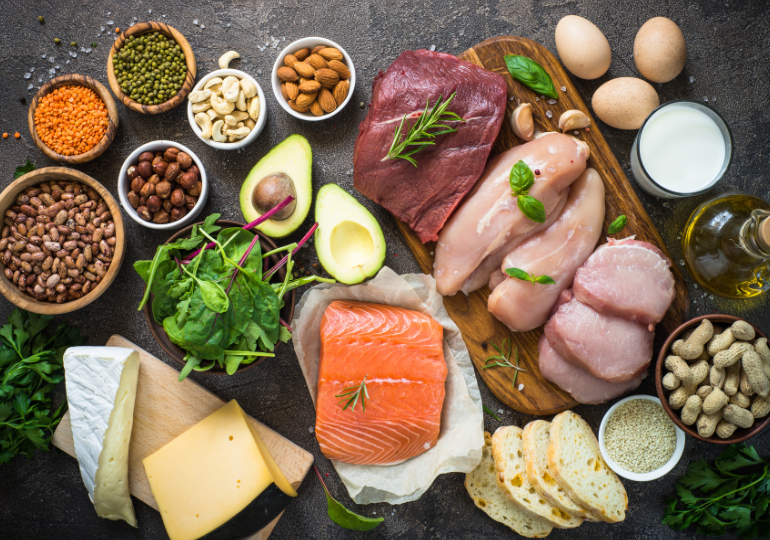Healthy skin and hair go beyond topical treatments and skincare products. Nutrition also plays a vital role in maintaining strength, resilience, and glow. One of the most essential nutrients for skin and hair health is protein. According to Dr. Jennifer Sawaya of U.S. Dermatology Partners Scottsdale, “A balanced diet, incorporating lean animal and plant-based protein sources along with essential vitamins and antioxidants, is key to achieving and maintaining vibrant, youthful skin.” In this blog, Dr. Sawaya answers the question, is protein really good for skin? That includes the best protein sources, pros and cons of protein supplements, and dermatologist recommendations for incorporating protein into your skincare routine and diet for optimal skin health results.
How Protein Supports Healthy Skin
Protein is comprised of amino acids which are essential components of hair, skin, and nail health. Protein makes skin smooth and supple and ensures stronger, more lustrous hair and nails. Some of the main ways that protein supports healthy skin include:
- Increased collagen and elastin production – collagen and elastin are structural proteins that keep the skin firm, smooth, and youthful. As we age, collagen production naturally declines, leading to wrinkles, sagging, and loss of elasticity. Consuming adequate protein helps the body produce collagen, which in turn supports skin strength and suppleness. Essential amino acids found in protein sources like eggs, poultry, and fish contribute to collagen synthesis, slowing down the visible signs of aging. There is also a small benefit from consuming exogenous collagen as well, typically found in powder or capsule form
- Improved skin repair – protein plays a crucial role in skin regeneration and wound healing. The amino acids in protein aid in cell turnover, helping to repair damaged skin, following environmental stressors, sun exposure, or injury. Individuals recovering from wounds, cuts, or skin conditions like acne can benefit from a protein-rich diet that accelerates the healing process.
- Increased hydration & barrier protection – the skin’s outermost layer relies on proteins and lipids to retain moisture and protect against environmental stressors. Consuming sufficient protein strengthens this barrier, preventing excessive water loss that leads to dryness, irritation, and premature aging. Proteins also help regulate the production of natural moisture to keep skin plump and hydrated.
- Reduced inflammation – skin inflammation is a common culprit behind conditions like acne, eczema, and rosacea. Certain protein sources, particularly those rich in omega-3 fatty acids, such as salmon, eggs, and walnuts, reduce inflammation and soothe irritated skin. A diet high in anti-inflammatory proteins contributes to a clearer, healthier complexion.
- Stronger hair and nail growth – hair and nails are primarily composed of keratin, a type of protein. A diet lacking in adequate protein can result in brittle hair, excessive shedding, and slow growth. Ensuring sufficient intake of protein supports hair strength, shine, and resilience. Additionally, protein-rich foods supply biotin and essential amino acids necessary for maintaining a healthy scalp and hair follicles.
Best Protein Sources for Skin & Hair Health
A diet rich in high-quality protein sources supports skin elasticity, hydration, and repair. Below are some of the best protein sources for skin health categorized into animal-based and plant-based options:
Animal-Based Proteins:
- Eggs – a good protein source that is rich in biotin and amino acids, essential for healthy skin and hair.
- Salmon & oysters – high in omega-3 fatty acids and zinc, which reduce inflammation and support skin healing.
- Poultry & lean meats – provide collagen-boosting amino acids necessary for firm and youthful skin.
Plant-Based Proteins:
- Tofu & tempeh – excellent vegan protein options that promote skin elasticity and hydration.
- Chickpeas & lentils – contain zinc, iron, and protein, all essential for skin repair and barrier function.
- Nuts & nut butters – protein source packed with healthy fats and amino acids that nourish the skin barrier.
- Whole grains – quinoa, oats, and other whole grains provide both protein and antioxidants that protect skin cells from oxidative stress.
- Soy milk & almond milk – Contain plant-based proteins that support skin hydration and overall health.
Should You Take Protein Supplements for Better Skin?
While whole food sources should always be the primary choice for obtaining protein, some individuals could benefit from utilizing protein supplements. However, there are pros and cons to using protein supplements for skin health:
Pros:
- Protein supplements can help people who struggle to get enough protein through their diet.
- Some high-quality protein powders contain added nutrients beneficial for skin, such as collagen peptides and vitamin C.
Cons:
- Some studies link whey protein to acne breakouts, especially in individuals already prone to acne. The quality of whey isolate matters in these cases, and patients should look for the purest forms possible.
- Many protein powders contain artificial ingredients, added sugars, and preservatives that contribute to inflammation and breakouts.
- Overloading on protein without sufficient water intake can dehydrate skin, making it appear dull and dry.
A Balanced Approach
A well-rounded diet that includes natural protein sources, antioxidants, vitamins, and adequate hydration is preferable to relying solely on protein supplements. If you do choose to use protein powders, opt for clean, high-quality options free from artificial additives.
Dermatologist-Recommended Tips for Getting Enough Protein for Skin Health
To maximize the benefits of protein on skin, dermatologists recommend the following dietary practices:
- Prioritize whole foods over supplements – lean meats, fish, beans, and nuts offer more skin-nourishing benefits than processed protein powders.
- Balance protein with healthy fats & vitamins – combine protein-rich foods with avocados, olive oil, and leafy greens for maximum skin nourishment.
- Stay hydrated – protein metabolism requires adequate water intake to support skin hydration and elasticity.
- Incorporate a variety of protein sources – rotate between animal and plant-based proteins to ensure a comprehensive intake of essential amino acids and nutrients.
- Note your skin’s response – if you notice breakouts or increased dryness after changing your protein intake, adjust your diet accordingly.
Incorporate Protein for Healthy, Youthful Skin
Protein is a fundamental component of glowing skin, strong hair and nails, and resilient skin barrier. Incorporating a variety of protein sources into your diet helps maintain youthful skin, accelerates skin repair, and supports overall skin health. While protein supplements can be useful in certain cases, prioritizing whole foods and maintaining a balanced diet with sufficient hydration remains the best approach for optimal skin, hair, and nail vitality. If you have specific concerns about your diet’s impact on your skin, consider consulting a dermatologist for personalized nutrition and skincare recommendations.
Schedule a Consultation with a Trusted Dermatologist
By adopting a protein-rich, balanced diet, you can naturally improve your skin’s appearance, texture, and overall health, ensuring a radiant and youthful glow. A dermatologist can help you create a skincare routine that supports your skin health goals, manage skin conditions, or work to achieve a specific improvement. Schedule an appointment at U.S. Dermatology Partners using our simple online scheduling request form. Once we hear from you, a local dermatology office team will be in touch to finalize the details of your upcoming visit.
Find a location near me
or


